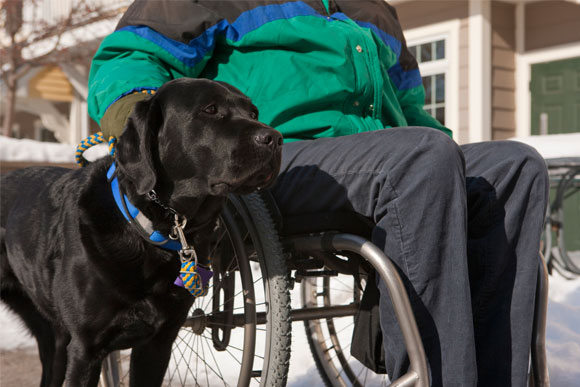
Many animals, including pigs, horses, monkeys, and even birds, can be trained to perform tasks that aid people with disabilities, with the most common service animal being the dog. Dogs can be trained to perform various tasks to help those with disabilities and impairments lead more independent and fulfilling lives.
The use of service animals has increased dramatically over the years, providing various benefits to the veteran community. Through scientific studies and testimonials from those with service animals, it is no secret that those with an animal companion are more likely to see positive physical and mental health outcomes.
A service animal is trained to assist a single person covered by the Americans with Disabilities Act (ADA). The ADA defines a service animal as “service animals are defined as dogs that are individually trained to do work or perform tasks for people with disabilities.”
Service animals are afforded the right to enter public establishments with their owner. Under the protection of the ADA, service animals are permitted entrance to businesses, including food establishments, nonprofit organizations, and government facilities that serve the public.
Under the Fair Housing Act and Section 504 of the Rehabilitation Act of 1973, service animals are also permitted to live with the owners regardless of the facility’s pet policies. Additionally, service animals are permitted to fly with their owner in an airplane cabin under the federal Air Carrier Access Act.
Veterans can benefit from a service dog whether they have a physical disability or mental disorders such as PTSD.
Service animals can be trained to:
Service dogs trained for veterans with PTSD are specifically trained to help alleviate the symptoms of PTSD. They can be trained to retrieve an item, get help, interrupt a night terror by licking, nudging, or pawing, use their body weight as a grounding mechanism to reduce panic or anxiety, and provide security to reduce hypervigilance in public places.
With a service dog, veterans are empowered and provided with a companion that can ease stress and loneliness while also reducing social anxiety, helping them return to school or work, and strengthening personal relationships. Service dogs can also help decrease reliance on prescription drugs and provide veterans with protection, security, and unconditional love.
In some cases, the VA does provide coverage for service animals. First, a veteran must visit their healthcare provider to discuss physical and mental health limitations. The doctor will determine if a service dog is the proper course of treatment. If a service dog is determined to be the best treatment, an application will be submitted on behalf of the veteran.
Every case is reviewed individually by a clinician who will assess the goals meant to be accomplished using a service dog. They will also evaluate the ability and the means of the veteran or their caregiver to care for the dog.
At Veterans Place, we provide veterans with various services to help them lead more fulfilling and self-sufficient lives. From housing to education assistance, we provide our veterans with the services they need through our community’s support. With your generous donation, we can continue our mission of ending veteran homelessness. Donate today to contribute to this mission.